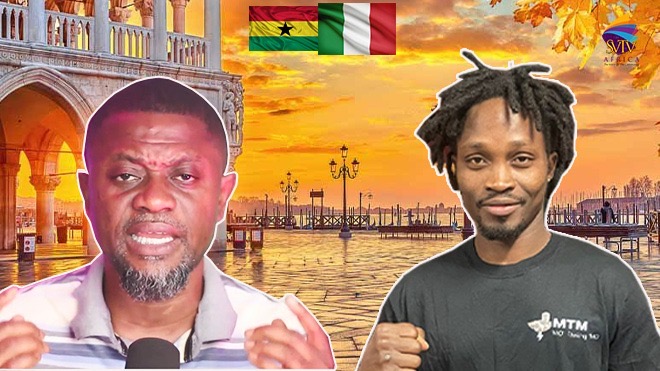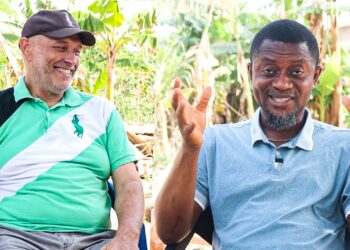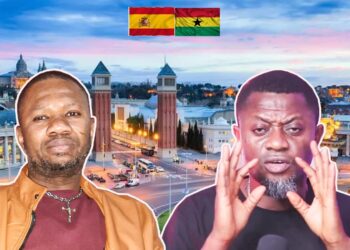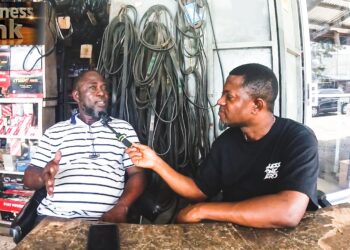A young man from Sunyani, Bono Region, embarked on a challenging journey in search of a better life.Born and raised there, he was a carpenter and a boxer trained by Nana Yaw Konadu.
Despite his efforts, life was tough. His father passed away when he was young, leaving his mother to take care of him and his siblings.
He often represented the Brong Ahafo region in national boxing competitions in Accra but was barely rewarded—once receiving just 20 GHC, which wasn’t even enough for basic medicine.
Realizing boxing wouldn’t sustain him, he returned to carpentry to make a living. One day, he received a letter from a coach looking for him, which led him to Techiman and eventually back to Accra.
However, his true dream was to travel. He decided to go to Libya, selling two cows to finance his journey. A man who had been to Libya before guided him, advising him on how to handle his money. With 1,000 GHC, he converted his cash to CFA, divided it as instructed, and set off.
His first stop was Saba, a village in Libya, where he called a friend who helped him reach Tripoli. He endured harsh conditions, staying in poor accommodations, but he was determined to support his family. Instead of taking the perilous sea route, he traveled by land to Tripoli.
His goal was simple: work hard, save money, and buy land for his mother in Ghana.
The journey was brutal. Smugglers crammed him into the boot of a small car with 30 others. One person died during the journey, but no one could make a sound. They spent a week on the road, facing hunger, war, and extreme conditions. Despite the hardship, he persevered, trusting that his sacrifices would pay off.
In Tripoli, he took on construction jobs and worked hard. Black migrants in Libya were often kidnapped for ransom, and he was abducted twice.
His family paid for his release, and he returned to work each time. He eventually met a Nigerian woman involved in prostitution and convinced her to stop, offering her a home. His skills as a builder were recognized, and Arab contractors sought him out for work.
He and the Nigerian girlfriend planned to travel to Italy for a better life. Their first attempt failed, and she was robbed. On their second attempt, they were arrested and detained for two months. Desperate, he sold a piece of land in Ghana to fund another attempt.
Eventually, a smuggler he knew promised to get them to Italy. At the seafront, only Arabs were allowed on the boats, as smugglers believed Black passengers would cause fights. His smuggler pushed him through without charging him, but his girlfriend had to pay $50.
They embarked on a dangerous sea journey with 130 people in a balloon raft. Only 15 survived. After drifting for days, they were rescued and taken to a larger ship, spending three more days at sea before reaching Italy. Authorities documented their stories, and he was sent to Florence.
Because he had saved a child during the journey and also saved his girlfriend, he gained a good reputation.
He was placed in a housing facility and, after sharing his boxing background, was enrolled in the Korotina Boxing Club. His trainer supported him, and he polished his boxing skills.
Later, he moved to another club and also learned a trade, working in a plastic manufacturing company.
His Nigerian girlfriend broke up with him immediately after the rescue ship arrived in Italy, stating that she wanted to continue prostitution to support her family. This devastated him, as he still loved her, but he had no choice but to move on and focus on his career.
Meanwhile, back in Ghana, he had a child from a one-night stand. However, the mother’s family initially rejected him, believing he was from a poor background and unworthy of their daughter. They even considered abortion, but his grandmother strongly opposed it, ultimately convincing them to keep the child.
Despite facing spiritual challenges in boxing, he continued to send money home monthly. Though his journey had been difficult, he had changed his family’s fortunes—his mother was now a landlady, and he had secured land in Ghana. Though he had never returned home, he wished to make things right.
Now, his family wants him back in their lives because of his success. Looking back, he believes traveling changed his life and advises young people to seize opportunities abroad.
However, he warns that the journey isn’t for everyone, especially those with health conditions like epilepsy or heart problems. Still, he believes that for those who can handle it, traveling is worth the struggle.
Watch The Video Below:
















